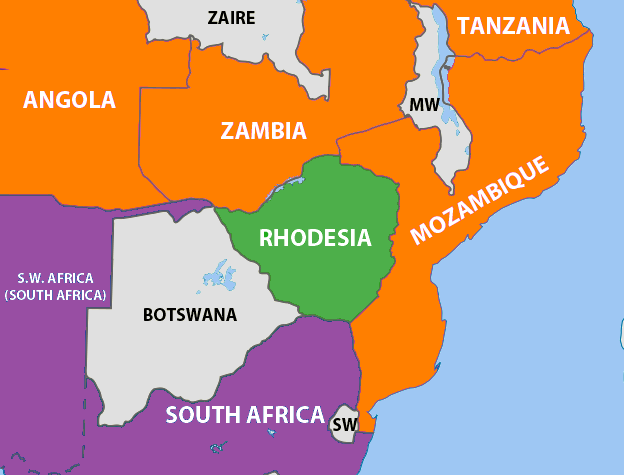Background:
 The war that took place in Rhodesia between 1964 and
1975 is known by different names: the Zimbabwe War of Liberation, the Second
Chimurenga, or the Bush War. Just as there are multiple names for this war, there are multiple perspectives in framing this conflict. To the white minority of three thousand who lived in the southern African county, it was a struggle against Communism and a fight to preserve a way of life. To the black nationalists seeking to establish majority rule, it was a struggle for equality representative democracy, and independence. This little-known chapter in the Cold War has received relatively little scholarly attention from a conflict management perspective. Most likely, this is because of the distasteful and exclusionary nature of the Smith government. Although the regime might have been abhorrent, the Bush War itself is not best left relegated to the past, because we can learn lessons about conflict management from it.
The war that took place in Rhodesia between 1964 and
1975 is known by different names: the Zimbabwe War of Liberation, the Second
Chimurenga, or the Bush War. Just as there are multiple names for this war, there are multiple perspectives in framing this conflict. To the white minority of three thousand who lived in the southern African county, it was a struggle against Communism and a fight to preserve a way of life. To the black nationalists seeking to establish majority rule, it was a struggle for equality representative democracy, and independence. This little-known chapter in the Cold War has received relatively little scholarly attention from a conflict management perspective. Most likely, this is because of the distasteful and exclusionary nature of the Smith government. Although the regime might have been abhorrent, the Bush War itself is not best left relegated to the past, because we can learn lessons about conflict management from it.
The Conflict:
What Difference did Sanctions Make?
 Economic sanctions had the effect of isolating landlocked Rhodesia. The country's neighbours, with the notable exceptions of South Africa and Mozambique, had the effect of walling the country in so that not just trade but resupply for the war effort could barely take place. The black nationalists enjoyed increasing support from neighbouring countries and were trained and supplied by Communist states such as East Germany and the Soviet Union. After 1974, Mozambique also provided state support to ZANLA, and Rhodesia gained another hostile neighbour. Moreover, Pretoria's policy developed towards distancing itself from the white settler regime, leaving Smith without a friend in the world. In this light, real pressure was coming down on the Salisbury as the resource-hungry security forces were without long-run chances of resupply after a decade and a half of war. Although sanctions alone might not have broken the back of Smith's war effort, the combined isolation effects and the declining economic situation due to labour problems made a negotiated settlement look like the best option possible.
Economic sanctions had the effect of isolating landlocked Rhodesia. The country's neighbours, with the notable exceptions of South Africa and Mozambique, had the effect of walling the country in so that not just trade but resupply for the war effort could barely take place. The black nationalists enjoyed increasing support from neighbouring countries and were trained and supplied by Communist states such as East Germany and the Soviet Union. After 1974, Mozambique also provided state support to ZANLA, and Rhodesia gained another hostile neighbour. Moreover, Pretoria's policy developed towards distancing itself from the white settler regime, leaving Smith without a friend in the world. In this light, real pressure was coming down on the Salisbury as the resource-hungry security forces were without long-run chances of resupply after a decade and a half of war. Although sanctions alone might not have broken the back of Smith's war effort, the combined isolation effects and the declining economic situation due to labour problems made a negotiated settlement look like the best option possible.
Why Should we Care?
The example of Rhodesia shows us what can happen when the international community takes a unified approach in dealing with an illegal regime. Rhodesia became a pariah state such that eventually not even Apartheid South Africa would support it. Rhodesia's economy pre-conflict was strong, but declined steadily as the costs of war mounted. This also demonstrates the vulnerability of a landlocked state to a sanction regime. It is worth noting that Western states took little action beyond diplomatic and economic pressure on the Smith government. A military invasion of Rhodesia was not necessary to see the transition to black majority rule in the country.
Further Reading:
Mills, Greg, and Grahame Wilson. “Who Dares Loses? Assessing Rhodesia’ Counter-Insurgency Experience.” The RUSI Journal 152.6 (2007): 22-31. Web. 04 Apr 16. http://www.thebrenthurstfoundation.org/files/Who-Dares-Loses.pdf.
Onslow, Sue, ed. Cold War in Southern Africa: White Power, Black Liberation. London: Routledge, 2009. Web.
No comments:
Post a Comment